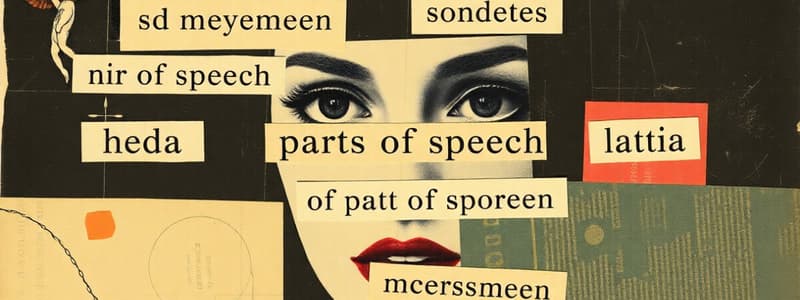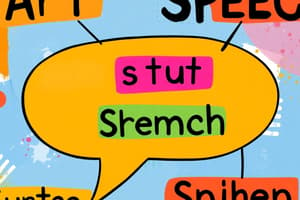Podcast
Questions and Answers
Which of the following is an example of a noun?
Which of the following is an example of a noun?
- Charming
- Dance
- Teacher (correct)
- They
What part of speech is 'rarely'?
What part of speech is 'rarely'?
- Pronoun
- Adverb (correct)
- Conjunction
- Interjection
Which option represents a verb?
Which option represents a verb?
- Whom
- Eat (correct)
- So
- Nor
Identify the part of speech for the word 'cruel'.
Identify the part of speech for the word 'cruel'.
What role does a conjunction play in a sentence?
What role does a conjunction play in a sentence?
Which word functions as a pronoun?
Which word functions as a pronoun?
What part of speech is 'toward'?
What part of speech is 'toward'?
Identify the part of speech for 'Oh my God!'.
Identify the part of speech for 'Oh my God!'.
Flashcards
What are nouns?
What are nouns?
A word that represents a person, place, thing, or idea. Nouns can be used with articles like 'the,' 'a,' or 'an.' Proper nouns begin with capital letters, while common nouns don't.
What are pronouns?
What are pronouns?
A word that replaces a noun. It stands in for a specific noun, called its antecedent.
What are verbs?
What are verbs?
A word that shows action or a state of being. Verbs often have a main verb and may include helping verbs.
What are adjectives?
What are adjectives?
Signup and view all the flashcards
What are adverbs?
What are adverbs?
Signup and view all the flashcards
What are prepositions?
What are prepositions?
Signup and view all the flashcards
What are conjunctions?
What are conjunctions?
Signup and view all the flashcards
What are interjections?
What are interjections?
Signup and view all the flashcards
Study Notes
8 Parts of Speech
- English has eight parts of speech: noun, pronoun, verb, adjective, adverb, preposition, conjunction, and interjection
- Parts of speech indicate how a word functions in meaning and grammatically within a sentence
- A single word can function as multiple parts of speech depending on the context
- Understanding parts of speech aids in determining the correct definition of a word from a dictionary
Nouns
- A noun is a word for a person, place, thing, or idea
- Nouns are often used with articles (the, a, an), but not always
- Proper nouns begin with capital letters; common nouns do not
- Examples: Person (Man, Woman, Teacher); Place (Home, Office, Town); Thing (Table, Car, Banana, money, music)
Pronouns
- A pronoun is a word used in place of a noun
- Pronouns usually substitute for a specific noun, called its antecedent
- Examples: He, she, they, yours, himself, herself, me, we, ourselves, who, whom, my, that
Verbs
- Verbs express action or being in a sentence
- Sentences typically contain a main verb and sometimes one or more helping verbs
- Examples: Run, dance, slide, jump, think, eat, walk, do, go, stand, write, draw, paint, sing, play, watch
Adjectives
- Adjectives modify or describe nouns or pronouns
- Adjectives often answer the questions "which one," "what kind," or "how many"
- Examples: Charming, cruel, fantastic, gentle, huge, perfect, pretty, rough, sharp, ugly, short, long
Adverbs
- Adverbs modify verbs, adjectives, or other adverbs, but not nouns
- Adverbs often answer the questions "when," "where," "how," "why," "under what conditions," or "to what degree"
- Adverbs often end in "-ly"
- Examples: Fully, almost, secretly, normally, occasionally, seldom, rarely, usually, frequently, badly, greatly, cheerfully, wishfully, grimly, eagerly
Prepositions
- Prepositions are words placed before a noun or pronoun to form a phrase that modifies another word in the sentence
- Prepositions are always part of a prepositional phrase
- Examples: Aboard, about, above, across, along, among, like, into, plus, via, with, since, toward, against, besides, despite
Conjunctions
- Conjunctions join words, phrases, or clauses and indicate the relationship between the joined elements
- Coordinating conjunctions connect grammatically equal elements
- Examples: And, but, or, nor, for, so, yet
Interjections
- Interjections are words used to express emotion
- Interjections are often followed by an exclamation point
- Examples: Psst!, Ooh!, Sorry!, Tut-tut!, Very well!, Rah!, Sigh!, Hum!, Whoope!, Curses!, Gee!, Whatever!, Duh
Studying That Suits You
Use AI to generate personalized quizzes and flashcards to suit your learning preferences.




